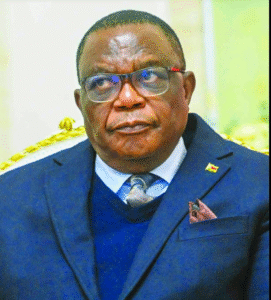500 DAYS OF DARKNESS: JOB SIKHALA’S IMPRISONMENT EXPOSES ZIMBABWE’S AUTHORITARIAN NIGHTMARE

Today marks 500 days since Zimbabwean opposition activist Job Sikhala was thrown behind bars — not for committing a violent crime, but for courageously protesting the grisly murder of his colleague Moreblessing Ali. Her death, allegedly at the hands of a Zanu PF-linked thug, shook the country. Sikhala’s fiery stand against this brutality has landed him in the country’s overcrowded, suffocating prisons with no bail, no trial, and no justice.
His application for discharge was thrown out today, deepening what is now undeniably a chilling case of political persecution. While Zimbabwe’s constitution guarantees bail and presumes innocence until proven guilty, those rights have become meaningless under Emmerson Mnangagwa’s increasingly authoritarian regime. For 500 days, Sikhala has remained detained not because he is guilty, but because he dared to speak out. He has become Zimbabwe’s most prominent political prisoner — a symbol of defiance trapped in a system that punishes dissent and protects impunity.
Sikhala’s fate is not isolated. His ongoing detention is part of a broader pattern of arbitrary arrests and unlawful imprisonment reminiscent of Rhodesian rule — a past Zimbabwe once fought to escape. But under Zanu PF, the line between yesterday’s colonisers and today’s rulers grows ever thinner. We now see a government that talks about sovereignty, yet rules through fear, silence, and repression.
The prisons that hold Sikhala are reportedly worse than those used under colonial rule — overcrowded, filthy, and inhumane. And yet, Mnangagwa’s government refuses to budge. They have turned bail into a privilege for the politically connected and trial into a distant mirage for opposition voices.
This is not just a legal tragedy; it is a national crisis. Sikhala’s continued detention is a barometer for the state of Zimbabwe’s democracy. The message is loud and clear: if you criticise the regime, if you question injustice, if you stand for victims like Moreblessing Ali — you will be silenced.
And yet, despite this heavy repression, Sikhala has become a lightning rod for resistance. His 500 days behind bars speak volumes about the courage of Zimbabwe’s pro-democracy movement. His imprisonment has exposed the judiciary’s lack of independence and laid bare the regime’s fear of truth-tellers.
The social and economic decay Zimbabwe is experiencing — from hyperinflation to health sector collapse — cannot be separated from this political repression. A regime that fears dissent is one that misgoverns in secret, punishes transparency, and thrives on fear. The longer Sikhala is jailed, the more it reveals about Zanu PF’s contempt for the rule of law and democratic principles.
As the world watches, the silence from international actors becomes more deafening. The global community must not look away. Job Sikhala’s incarceration is not just about one man — it is about the soul of a nation. It is about whether Zimbabweans are free to express themselves, to protest injustice, and to choose their leaders without intimidation or fear.
Today, after 500 days of unlawful detention, Sikhala is not broken — and neither is the hope he inspires. But hope needs action. Zimbabweans at home and abroad must continue to demand his release. Civic organisations, opposition parties, and the diaspora must raise their voices louder than ever. And the world must finally treat Zimbabwe’s human rights crisis with the urgency it demands.
Job Sikhala’s case is not just a stain on Mnangagwa’s record — it is a dark mirror showing us what Zimbabwe has become under Zanu PF’s rule. A land where justice is denied, freedoms are crushed, and silence is enforced through chains.
But 500 days in prison will not erase the truth. It will only strengthen the call for justice.
Free Job Sikhala. Free Zimbabwe.



